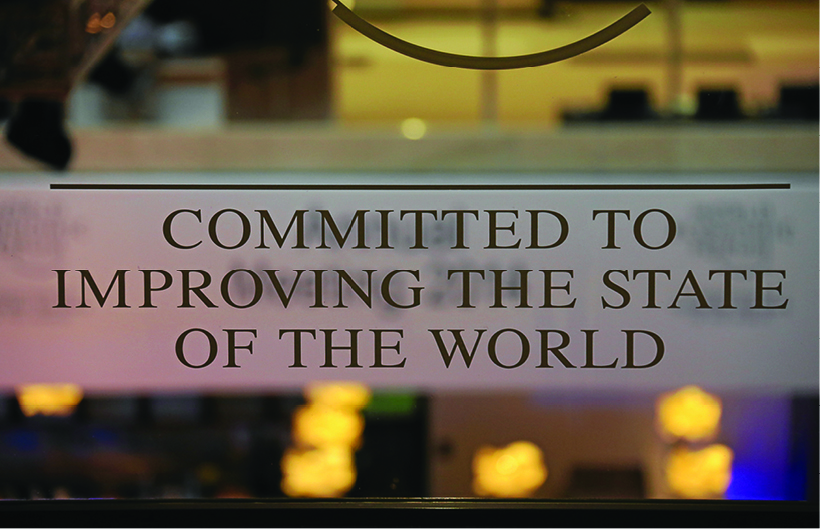LEADING ECONOMISTS, powerful CEOs and high-profile politicians converged at the annual World Economic Forum (WEF) held last January 22 to 25 in Davos, Switzerland. The forum was a gathering place for the world’s elite to discuss global matters such as economic development, international conflict and environmental sustainability.
The theme for this year’s forum was ‘The Reshaping of the World: Consequences for Society, Politics and Business.” The event focused on poverty alleviation—particularly the increasing inequality between the “1%” and the impoverished—and environmental degradation, which is steadily becoming a silent killer in the Third World.
The WEF, according to its website, is “committed to improving the state of the world by engaging business, political, academic and other leaders of society to shape global, regional and industry agendas.”
Sustaining growth
This year’s highlights included a session on stimulating sustainable growth and improving economic resilience. During her opening address, Park Geun-hye, the President of the Republic of Korea, warned, “The future will be defined by a creative divide…[as entrepreneurship is] the driving force of stable, inclusive growth.” Entrepreneurship helps put innovation to action, creating out-of-the-box solutions for today’s economic, social and political issues.
According to the World Bank, inclusive growth is achieved when both the “pace and pattern of growth” are addressed simultaneously. It must feature an economy wherein all social sectors advance, not just the upper classes.
The Philippines arguably has a long way to go before achieving inclusive growth. As The Manila Bulletin reported in January of this year, “Philippine society harbors a well-entrenched and powerful oligarchic elite whose small number as a ratio to the near 100 million population controls 80 percent of the nation’s wealth.”
Inclusive growth is important not only for the economy as a whole, but for individual people. “Inequality is a determinant of people’s capabilities. One who is richer may be at more liberty to do some things since one may be able to actually afford doing those things,” said Ateneo Economics Association President Rafael Rubio.
He added that it is “high time for leaders to act upon [the growing inequality].”
A balancing act
Though sustaining economic growth was the focus of the forum, it also centered on the imperative that environmental protection is no longer sacrificed to achieve that end. This year, the forum had a record number of 23 sessions dedicated to climate change, resources security and sustainability.
“Climate change and related impacts such as extreme weather events, food crises and water crises are among the most pressing global economic risks,” the WEF website reported.
Such a situation forces countries to straddle the line between economic growth and sustainable development, a dilemma that forces politicians to look for creative solutions.
“Creativity does not degrade the environment; it unlocks opportunities for sustainable growth. It is inherent to all people and therefore holds promise for inclusive growth,” said Ellen Johnson-Sirleaf, President of the Republic of Liberia, in the forum.
In addition to this, the United Nations Framework Convention on Climate Change and the WEF have collaborated to advance cooperation between the public and private sectors regarding future action on climate change. The goal of the collaboration is to increase support and global cooperation by 2014-2015.
This partnership emphasized the need for both private corporations and governments to invest in green growth. “Our objective is to raise political will and to catalyze ambitious and decisive actions on the ground,” said Secretary-General of the United Nations Ban Ki-Moon during the forum.
Although no concrete policy was made during the forum, “Over 100 leaders committed to intensify and expand the initiative’s work in a meeting,” reported the WEF.
A lack of representation
Though the attendees raised a number of different points of concern, there were those who felt that the forum’s representatives were wanting. Some pointed out the absence of the people most affected by the topics being raised: The poor.
According to Ateneo Debate Society President Dwight Tan, “There’s a problem when only leaders are part of the discussion. Besides politicians and businessmen, where are the poor? Where are the people displaced by the economic policies, the people who are marginalized?”
However, despite the WEF’s flaws, Tan noted that it acts as medium for discourse and stresses the relevant issues affecting the world of tomorrow. With this, the WEF plays a critical role in fostering economic development, enabling and encouraging nations to work together.
“A lot of economic problems are transnational in nature and cannot be solved by just one country acting on its own. Theoretically, a global forum is necessary to resolve the deadlocks where individual actions do not suffice,” Tan said.




